'Outsiders are the ones who have to make the biggest journey to realise themselves, to come back to some sense of normality.'
Director Jacques Audiard and actor Jesuthasan Antonythasan discuss the human landscape behind the award-winning film, Dheepan, with Aseem Chhabra/Rediff.com
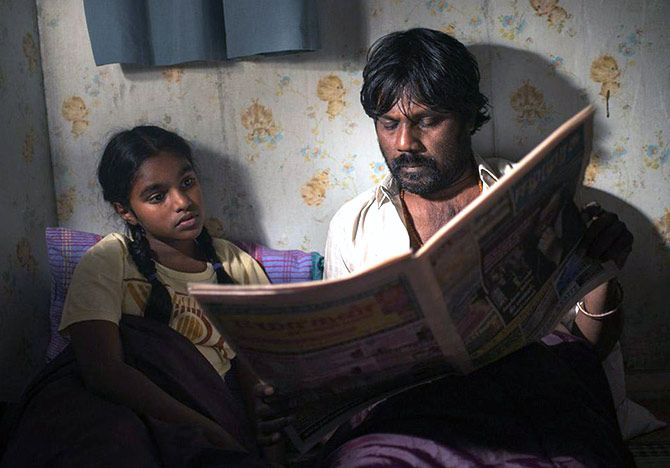
Jacques Audiard is a French filmmaker whose films have played well at film festivals and won many prestigious awards, including the French Césars, BAFTAs and an Oscar nomination (for the 2009 A Prophet).
Audiard has won three awards at the Cannes Film Festival -- the best screenplay for the 1996 Self Made Hero, the Grand Prix for A Prophet and this year the Palme d’Or for Dheepan.
Dheepan tells the story of three Sri Lankan Tamils -- a man, a woman and a young girl, who pretend to be a family and then arrive as refugees in France. While the three are trying to escape the brutal civil war in Sri Lanka, their journey into France is fraught with tensions -- vast cultural differences and then they get drawn into another kind of violence in the suburbs of Paris.
Dheepan is a deeply moving and gripping film. But it also focuses on the spirit of the Sri Lankan Tamil refugees and their determination to make a better life in a not-so-easy foreign country.
The title role in the film is played by Sri Lankan actor and novelist Jesuthasan Antonythasan, who himself was a member of the Tamil Tigers, and then fled the civil war and Sri Lanka on a false passport. His journey took him to Hong Kong, Thailand and eventually to France.
Dheepan had its North American premiere at the Toronto International Film Festival. Aseem Chhabra/Rediff.com spoke to Audiard and Antonythasan through translators -- one who translated French to English and the other Tamil to English. Even though Antonythasan has lived in France for nearly 25 years, he speaks relatively little French and English.
Jacques, I am sure many people have told you, but it's such an amazing film. I have seen all your works, but this was so moving and Jesuthasan is fantastic in it. I have read about his dramatic life, but I am curious about how you came to make a film about Sri Lankan refugees?
Jacques: There were several steps. At the very beginning I wanted to remake Sam Peckinpah's Strawdogs with people who are coming from somewhere else. When I was working with my co-writer Noe Debre we decided that we wanted to have characters who had nothing to do with French culture, language or the old French empire. We wanted to create the linguistic barrier.
Noe told me about the civil war in Sri Lanka. In Europe no one seemed to be talking about this war, except in England, of course. For me that seemed like a perfect plot. The people from Sri Lanka had no linguistic connection to France, they had no representation here. So we thought of giving them and the struggle a face and a voice.
How much research did you have to do? It was a very complicated war.
Jacques: I read books and papers, watched a BBC documentary, and I also met some Tamil refugees in Paris. At the same time I didn't want to learn a lot about the war, because I was not making a documentary about the situation in Sri Lanka. We wanted to make a fictional story about the refugees in France.
There was also the issue that when the movie starts it is about events many years ago. But I was making the film about today. It naturally had to be fiction.
And at what stage did you meet Jesuthasan?
Jesuthasan Antonythasan: The script was ready and then they went with the casting director internationally. They found me through my friends in India and that's how I got a shot at auditioning.
But you were already in France.
Jesuthasan: Yes, my friends in the Indian film industry suggested my name. It was an international search, but I was already living in France at that time.
Jacques, did it make a difference that Jesuthasan was already living in France? Did it impact your decision?
Jacques: It's funny because I had discovered Jesuthasan at the second or third casting session. I couldn't believe that I had found the right person right away. I continued meeting other actors -- nearly 50, 60 of them, including in India. I went to Chennai to audition actors, before I finally realised that Jesuthasan was the right person for the character.
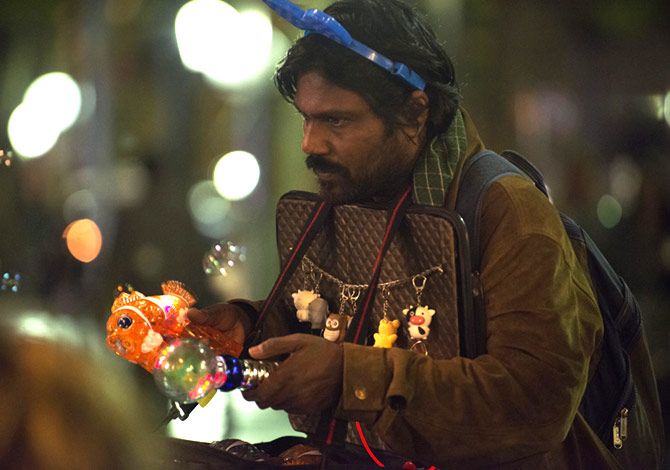
I am curious since Jesuthasan's life history is similar to the character. Did that help shape the character you were looking for?
Jacques: A Tamil in Paris is automatically a refugee. He couldn't be a tourist. The only thing I knew about Jesuthasan was that he was a writer. But I didn't know that he was part of the Tamil Tigers. That I discovered after he had been cast. In any case that knowledge would not have affected my choice.
Mostly I have to connect with the actor. If he had been a bad comedian or a bad actor, we couldn't have cast him just because he was a former Tamil Tiger.
And Jesuthasan, I was curious when you played the role, the fact that you had lived that life, did that help or hamper your portrayal on the screen? Your character had a similar sort of a graph as you did.
Jesuthasan: No doubt there were a lot common things between Dheepan and myself. We were in the LTTE (Liberation Tigers of Tamil Eelam). We are immigrants and we came out of Sri Lanka on fake passports. And we faced similar situations. But the rest of the story and character is Jacques' treatment.
I enacted the character as I was instructed to. Whether or not the character had similarities helped or hampered, I would say it helped me understand the role better. When it came to acting it out, I went based on his directions.
Jacques, in your films, most of the characters are outsiders. So in Self Made Hero, he was a loner and he made up the whole story. In The Prophet he's an Arab. In Rust and Bone, she loses her legs and is not a part of society anymore.
What attracts you to the subjects of outsiders and then you bring them into mainstream France?
Jacques: First, I don't want to talk about people who are like myself. I am drawn to people who are not like me. I am too normal. I am curious and interested about people living in other dimensions.
And those outsiders, or sometimes the outcasts, they are the ones who have to make the biggest journey to realise themselves, to come back to some sense of normality.
Also those people who are outsiders, they want to have a new life. And the question is posed for a writer and filmmaker -- how many lives can they have? What is going to cost them and what will they gain to have a second or a third life? And they will have to work hard to have this new life.
One of my favorite scenes in the film is the conversation between Jesuthasan and his fake wife about the French sense of humour. She says to him that even in Tamil you are not funny. Give me an idea how you wrote the scene and how they both acted it out. It's absolutely brilliant.
Jacques (addressing Jesuthasan): You remember better than me. Was the scene written or improvised?
Jesuthasan: It was written.
Jacques: Completely?
Jesuthasan: Yes.
Jacques: Before, the two characters are like cats and dogs. It was the first moment that they are intimate with each other.
But it was an interesting observation about someone from a foreign culture and that the sense of humour can be so different in other cultures and different languages.
Jacques: For me it was an ironic way to talk about the shortcomings of the character. The character is flat and boring. I didn't want to be mean, but say it in an ironical way.
And Kalie (actress Kalieaswari Srinivasan who plays Dheepan's fake wife in the film) is so good because she says in a certain way that you can see she is starting to love the guy. She does not say it in a mean way.
When people don't have a sense of humour, it can appear really funny to others. His fake wife does not find him funny, but in that scene he is very funny.
Jesuthasan, are you funny?
Jesuthasan: Not at all! (laughs)
Actually as a writer my writings are considered most humorous and comedic ('Really?' the Tamil translator asks him as she bursts out laughing). Seriously I think I am a fun loving guy, and easy going. To be honest I am happy. I haven't cried in 30 years maybe.
Another thing that I loved in the film was the character of the gangster (played by French actor Vincent Rottiers). He was so vicious and charming at the same time. I was scared of him and yet he was so likable and seductive.
Jacques: It's funny you say that. The only problem I had with Vincent was that I kept wondering if he looked scary enough. It may have been scarier if I had taken a big black actor to play that role. He could be mean, but not interesting.
What I wanted was a Shakespearean character like Henry V. He is coming from a lineage, where his father was bad also. But he is like a Shakespearean prince.
What was the experience of shooting in India like?
Jesuthasan: We shot the refugee camp scenes in Rameswaram.
Jacques: The London scene in the end was shot in Ooty.
Really? The house where the family was sitting -- that was in Ooty? Wow! I couldn't tell that. I was curious about shooting in India and that experience?
Jacques: I loved it. People work in a totally different way, but I liked it.
What do you think people in Europe and France will take from a story like this? Look what's happening in France between the older immigrants from Africa and the Arab world and now these newer refugees.
Jacques: The post-colonial situation brought the people from the Maghreb to France. They are French, with French passports, but from African countries. The new wave of immigrants don't have the French cultural experience.
Jesuthasan, you have lived in Paris for 25 years. How do the French people react to you?
Jesuthasan: There was no French colony in Sri Lanka. So we have the added pressure of the language barrier and also understanding French culture. That makes the immigrant experience for the Sri Lankan refugees much more difficult in France. And that's why a lot of them chose to go to England or even Canada. They can jive with the culture much more easily.
In saying culture I mean everything -- the differences in the bus systems, the post boxes and even the electrical outlets. So that makes it really hard for us.
When it comes to how the French community welcomes us, I don't think the Sri Lankan community integrates that well with the French. The welcoming is not there. And that's why they end up creating their own little Sri Lanka, or specifically Jaffna, within France. They stay within that enclosed community within Paris.
Are you just a writer or will you be acting more?
Jesuthasan: I am always writing. I also participate in talks and give speeches. I travel a lot speaking for different groups.
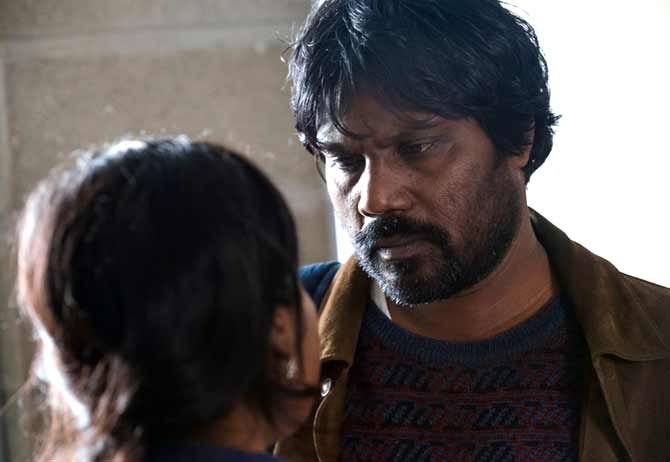
But you have not gone back to Sri Lanka. The civil war is over.
Jesuthasan: Not yet. There are still issues there. There is still government occupation of Tamil lands. There is no real democracy. I cannot legally visit Sri Lanka, because I don't have the papers and documentation to go back there.
I came out on an illegal passport. And I don't want to go there as a tourist. I will only go back when I have the right to speak and write freely about my beliefs. And that's not happening there.
In fact, I had difficulty getting into Canada for TIFF.
Really? What passport do you have?
Jesuthasan: I have a special travel document for refugees.
That gives you the right to live in France and work there?
Jesuthasan: Yes!
You are not a French citizen?
Jesuthasan: No. Normally you can apply after five years, but I haven't.
But you have left France and traveled to other countries?
Jesuthasan: Yes I have. I went to India to shoot the film. But they questioned me coming to Canada. I got the visa, but it happened at the airport.
Will the film be shown in Sri Lanka or India soon?
Jacques: I don't know if it will get shown in India. Sri Lanka, I don't think so at all.





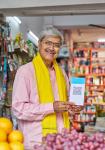


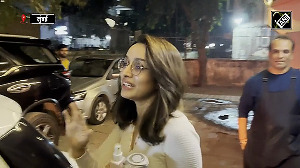
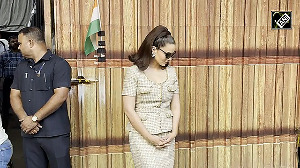
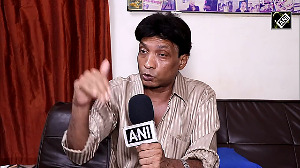
 © 2024 Rediff.com -
© 2024 Rediff.com -